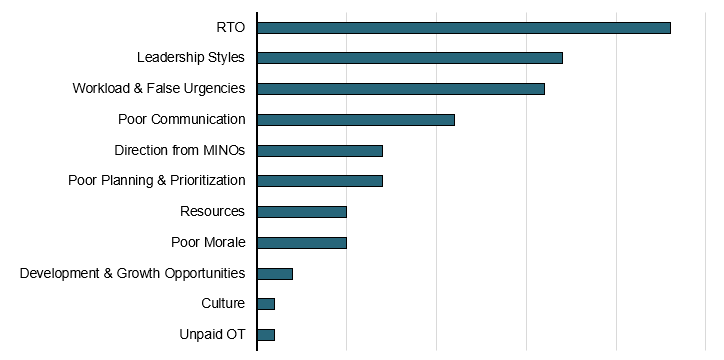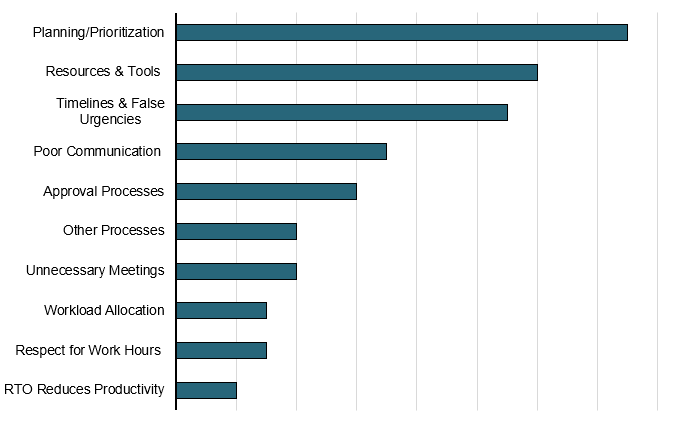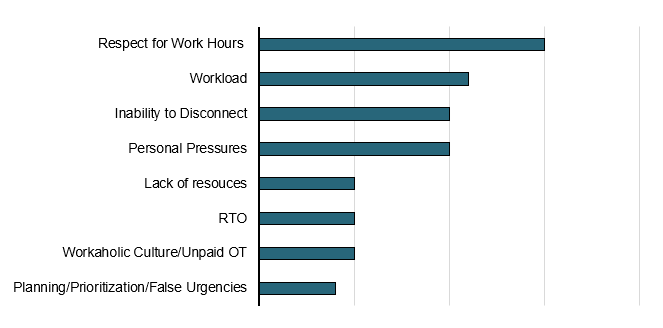Results from Moderated Discussions with Employees
August 2023
Background
- Moderated discussions were held to further understand recent decline in metrics pertaining to employee wellbeing. Focus of discussion was on:
- Employee Satisfaction;
- Workload management;
- Work-life balance; and
- Other issues raised within the respective discussion groups.
- Employees were invited to participate and self-identify within five employee groups: Equity seeking employees, Executives, Administrative and Internal Services, Economists and a French speaking discussion group
- A total of 72 Department of Finance Employees participated in the discussion groups
Employee Satisfaction
- Each focus group asked participants why data indicates a drop in employee satisfaction
- The majority of comments related to:
- Hybrid and dismay that the Department has implemented a 50% RTO noting that some departments are implementing the minimum requirement within the TBS guideline of 40-60%.
- Leadership styles with almost 42% of comments related to leadership specifically mentioning challenges working with "senior management"
- "Buckling" workloads and false urgencies
- Poor communication

Workload Management
- All groups were asked to identify issues affecting workload management. The top issues cited were:
- Poor planning;
- Lacking resources and or tools; and
- Unrealistic timelines/false urgencies.
- Suggested solutions were varied but employees spoke of
- Better communication and planning;
- Clear, consistent, streamlined processes (especially in relation to approvals);
- Respect for work hours and improved allocation of work; and
- Management to push back on "urgent" requests.

Work-Life Balance
- All groups were asked to identify issues affecting work-life balance. Participants said their work-life balance was most negatively affected by:
- Lack of respect for work hours and the inability to disconnect;
- Workloads; and
- Personal pressures.
- Possible solutions offered included:
- A Department-wide Right to Disconnect Policy
- More resources (FIN is too lean) and evaluating what is truly "urgent"
- Addressing the "workaholic" culture that makes it difficult for employees to say no

Employee Identified Themes
- Finally, each discussion group was offered the opportunity to further discuss two or three topics in more detail
- 3/5 groups focused on the Department's RTO policy
- 2/5 groups focused on Leadership Styles/Behaviour
- Further discussions were held:
- Communication
- Employee Development
- Workplace Culture
Employee Identified Themes: RTO
Comments within these discussions focused on:
- The inconsistent messaging and lack of transparency around the need to RTO and why FIN's policy mandates 50% of the time
- Inconsistent implementation between teams and branches
- Technical problems in conducting hybrid meetings
- The negative impact commuting has on work-life balance
- The feeling that employees worked longer hours during the pandemic in absence of a commute and now that same level of productivity is expected with less available time
- Feeling lonely when in the office, meeting remotely with colleagues
Proposed Solutions:
- Changing the Policy from 50% in the office to 40%
- Better coordination of days when teams/Branches should be in the office
- Ensuring the right to disconnect
- Ability to work from elsewhere in Canada for short periods of time (e.g., summer, winter holidays)
- Greater flexibility during summer months and major holidays
Employee Identified Themes: Leadership Styles/Behaviour
Comments within these discussions focused on:
- Inadequate communication, unclear expectations and lack of decision making
- Too many priorities, "urgencies", trackers
- Micromanaging and lack of trust
- Bullying and disrespectful behaviours
- Feeling that work is not appreciated or valued
- Too many layers for approvals
Proposed Solutions:
- Improve top-down communication
- More engagement of staff from all levels in decision-making
- Clearly identify priorities, created with input from staff
- Clear vision and consideration of how to match resources with tasks
Employee Identified Themes: Communication
Comments within these discussions focused on:
- Lack of communication from senior management
- At times communications lacks respect
- More inclusive meetings so that staff does not feel cut out of critical informationrelating to their workload
Proposed Solutions:
- Improve top-down communication
- Employees need to feel that their feedback is being considered in actions
- More consideration to tone and timing of messages
Employee Identified Themes: Employee Development
Comments within these discussions focused on:
- Lack of clarity of expectations for advancement
- Lack of consistency on promotions across the department
- Awareness during performance management conversations about training
- Being provided time and/or finding time for training
Proposed Solutions:
- More consistency and transparency pertaining to promotions
- Being given time for training
- Having a dedicated flexible training budget
Employee Identified Themes: Workplace Culture
Comments within these discussions focused on:
- The lack of transparency in decision-making
- Disconnection from colleagues, less social opportunities
- Negative impacts of poor planning and priority setting on staff workloads andrequired overtime
- Feeling that you must be a "workaholic" to work at Finance
Proposed Solutions:
- Improvements to employee onboarding and integration
- More social and networking opportunities
- More promotion of services and tools offered
Proposed Next Steps
Short term actions (August to October):
- Share Employee Discussion Group results with Senior Management
- EXEC, MOC
- Share report with Discussion Group participants
- Publish and communicate results on Infosite
Medium term actions (October onwards):
- Develop and communicate actions planned, next step, and report on progress
- Take stock of progress and re-assess approach in light of Fall 2023 Pulse Survey results (launch in October)